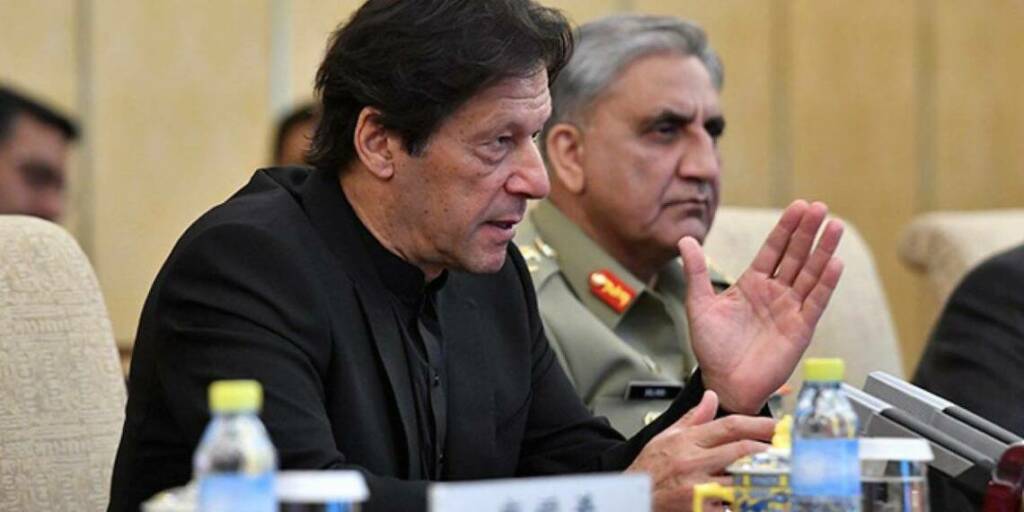Pakistan is being battered by widespread Islamist protests and the first army rebellion since an attempted coup by the junior officers of former Pakistan President Muhammad Zia ul-Haq. As such, the country is facing unprecedented chaos. To be precise, the country’s Prime Minister Imran Khan and its Army Chief General Qamar Bajwa are likely to be its first casualties.
So, let us explain how Khan and Bajwa are heading towards a major disaster. Pakistani Army, which controls the Imran Khan government and the entire civilian establishment in the Islamic Republic, funded the rise of Tehreek-e-Labbaik Pakistan (TLP). Pakistani Army and the Inter-Service Intelligence (ISI) had used the TLP, an Islamist hardline group, to tame former PM Nawaz Sharif. But now the TLP has come back to bite General Bajwa and Pakistan PM Imran Khan.
Presently, the Pakistan government is facing massive protests, after it banned TLP and arrested TLP leader Saad Rizvi in Lahore on unspecified charges. The rebellion against the Pakistani Army-run Imran Khan government has intensified further following the killing of TLP protesters by police and security forces.
To put it bluntly, the Imran Khan government is facing the wrath of hard-core Islamists, who was propped up in the first place to mount trouble on Nawaz Sharif. The protests have gone as far as denigrating the Pakistan military, by use of slogans like ‘fauj wapas’ (Army go back.)
Pakistani Military personnel being pushed out by radical TLP supporters on the streets of Pakistan, screaming – ‘Fauj Wapas’. Ironical. Just a few years ago Pakistan Army and ISI were paying the same radical outfit TLP openly. TLP was banned earlier today by Pakistan Govt. pic.twitter.com/JMWsH2pq8K
— Aditya Raj Kaul (@AdityaRajKaul) April 14, 2021
So, how did the protests ignite an internal rebellion within the Pakistan Army? Well, it has more to do with growing dissatisfaction against Pakistan Army Chief General Qamar Javed Bajwa.
A quiet war going on within the Pakistan Army ranks since 2019. At that time, India had scrapped the special status of its erstwhile state of Jammu & Kashmir. Later, the erstwhile state was bifurcation into two Union Territories. While strategic circles in Pakistan were flummoxed by India’s internal move, General Bajwa made most of the situation and instructed the Imran Khan government to give him a three-year extension.
General Bajwa’s extension did not go down well with his immediate juniors. In a country, where the Army General is the de facto head of government, Bajwa’s heir-apparents would have hated how the sitting General was stealing their share of governmental power. It was reported that seven Pakistan Army Generals even teamed up with the Pakistan Chief Justice to block the extension, albeit unsuccessfully.
Yet, General Bajwa continues to face stiff opposition from his immediate juniors. Also, the soldiers in Army ranks are not happy and there a plethora of reports and videos revealing how Pakistani troops are being spotted at the protests led by the TLP and hardline Islamists. Some of the troops are coming out openly rebelling against the Imran Khan government over its ongoing crackdown against the TLP.
And then there are other issues like the recent ceasefire between Indian and Pakistan Armies. Factions of the Pakistan Army would, of course, be unhappy over the move especially if you consider the visceral hatred for India.
Pakistan Army in rebellion mode against Imran Khan after several radical TLP protesters killed by police and security forces in Pakistan during protests. A soldier of the Pak Army asks Army Chief in a public video to ask Imran Khan to control his ‘dogs’ (Police) or face action. pic.twitter.com/zq0E7YrXw1
— Aditya Raj Kaul (@AdityaRajKaul) April 18, 2021
Multiple Pakistan Army personnel commit to wage jihad against the state if it fails to expel the French Ambassador to Pakistan over Prophet cartoons.
Army unhappy over Govt crackdown against radical Islamist outfit, Tehreek-e-Labbaik Pakistan.
Perfect recipe for a civil war. pic.twitter.com/a2te7naD9v
— Sonam Mahajan (@AsYouNotWish) April 15, 2021
🇵🇰 Soilder Warns of Mutiny if Chief of Army doesn't Step in and Control Gen0cide of Is|amic Protestors by Imran Khan Govt .
Demand of Protestors is to throw French Assets out of Pakistan.#CivilWarinPakistan #PakistanCivilWar pic.twitter.com/gsFJpfuArk— Megh Updates 🚨™ (@MeghUpdates) April 18, 2021
This video shared on Pakistani groups shows dozens of policemen with rifles joining terror group TLP in protest against Imran Khan govt. Apparently more than 100 policemen & soldiers have mutinied. Civil war like situation on Pakistan. pic.twitter.com/KOjL7tEMdJ
— Smita Prakash (@smitaprakash) April 19, 2021
For the first time since the failed coup against Zia-ul-Haq, the Pakistan Army is getting divided. However, the bigger victim of this division is going to be Imran Khan. After all, the Pakistan Army controls the government and Khan is a puppet PM. Functionally, Khan is nothing more than a glorified clerk of General Bajwa. Ultimately, Imran Khan will become a scapegoat for General Bajwa and the Pakistan PM would inevitably lose his chair.
Meanwhile, Bajwa is making all attempts to survive the massive rebellion that he is facing from his own officers and soldiers. Pakistan is even bringing a law that would penalise criticism of the Army. Yet, the level of pressure that Bajwa is facing is unsustainable and unprecedented for a Pakistan Army Chief. As such, he will ultimately succumb to it and become an initial casualty of the present unrest in Pakistan.
